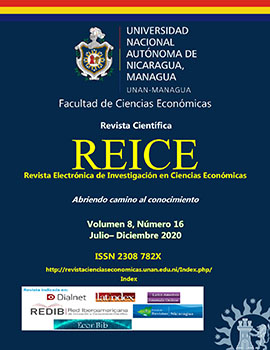Problems and prospects of factoring market development in Russia
DOI:
https://doi.org/10.5377/reice.v8i16.10719Keywords:
factoring, bank credit, liquidity, accounts receivable, corporate financeAbstract
Under the conditions of the economic crisis and fierce competition, companies are able to efficiently use affordable financial resources such as factoring, which is a competitive business financing tool that meets international standards. The benefits of factoring can be seen in all participants of this service. It is beneficial for suppliers in terms of increasing sales, turnover, and reducing cash gaps. Due to the factoring, buyers obtain commodity loans and provide the optimal use of working capital. Commission merchants increase in their revenues and the number of customers, and strengthen their market positions. In the global market, an increase in factoring regardless of the presence or absence of a crisis leads to an increase in the volume of trade flows. In Russia, the popularity of the factoring is low compared to bank loans, especially among small and medium-sized businesses. The paper analyses the composition of the players in this market, examines the dynamics of the volumes of financing provided, the weighted average cost of factoring in comparison with the interest on loans, the number of participants, and financing by industry and region of the country. Based on an analysis of the current situation and long-term market data, the paper summarizes the problems of factoring in Russia, and identifies key factors for factoring market growth in the future.
Downloads
833
References
Auboin, M., Smythe, H., & The, R. WTO. (2017). Supply Chain finance and SME: Evidence from International Factoring Data. World Bank: Official site. URL: http://pubdocs.worldbank.org/en/210701480467903739/2-Auboin-Smythe.pdf
Baldina, Yu.V., Petruk, G.V., & Lebedinskaya, Yu.S. (2017). Public and private sector entrepreneurship as a tool of dynamic functioning of tourism cluster at the territories of outstripping development (case study of Primorsky krai, Russian Federation). Economic and Social Changes: Facts, Trends, Forecast, 10(1), 200-217.
Bubnovskaya, T.V., Vasilenko, M.E., Titova, N.Y. (2018). Theoretical aspects of diagnostics of economic security of the enterprise (Article) [Aspectos teoricos del diagnostico de seguridad economica de la empresa]. Opcion, 34(87-2), 457-470.
Chegovadze, L.A. (2020). "Claim as an object of the right to present it by cession" Bulletin of Moscow University of the Ministry of Internal
Affairs of Russia, 1, 46-50. doi: 10.24411 / 2073-0454-2020-10009
Dakhnenko, S.S., & Vengerovsky, E.L. (2020). Some issues of improving the current legislation in the field of financial support and lending to small and medium-sized enterprises. Theory and Practice of Social Development, 1 (143), 111-116.
Ivashchenko, N.P., Shastitko, A.E., & Shpakova, A.A. (2019). Smart contracts in the light of the new institutional economic theory. Journal of Institutional Studies, 11 (3), 064-083. DOI: 10.17835 / 2076-6297.2019.11.3.064-083
Konvisarova, E.V, Levchenko, T.A., & Pustovarov, A.A. (2019) Theoretical and Practical Aspects of Financing the Road Economy in the Supply Chain Strategy of Russian Federation. International Journal of Supply Chain Management, 8(6), 853-857.
Koren, A., Vodopyanova, V., Pustovarov, A. (2019). Development of a Supply Chain Policy for Financing Instruments System of Foreign Economic Activity. International Journal of Supply Chain Management, 8(6), 549-554.
Koren, A.V., & Pustovarov, A.A. (2018) Development of financial products based on the use of digital innovative technologies. Azimuth of Scientific Research: Economics and Administration, 3(24), 130-133.
Koren, A.V., Vodopyanova, V.A., & Pustovarov, A.A. (2019). Development of a Supply Chain Policy for Financing Instruments System of Foreign Economic Activity. International Journal of Supply Chain Management, 8(6), 549-554.
Krivoshapova, S. V., Samsonova, I. A., & Bedrachuk, I.A. (2019). Evaluation of Supply Chain Planning by Currency Control Bodies in the Russian Federation. International Journal of Supply Chain Management, 8(6), 499-506.
Lebedinskaya, Y.S., Koshevaya, E.S., Petruk, G.V., & Shnaider, O.V. (2018). Advanced development zones of the Primorsky territory as a basis for regional integration in the APR. Revista San Gregorio, 27, 248-259.
Ligus, A.S., & Savaley, V.V. (2018). Factoring and forfaiting: assessing the state of prospects for application for financing foreign economic transactions. Financial Management, 2, 41-50.
Marchenko, N.S., & Konvisarova, E.V. (2018) Features of diagnostics of the level of economic security of seaports. Azimuth of Scientific Research: Economics and Administration, 2 (23), 229-233.
Terentieva, T.V., & Korneiko, O.V. (2017). New approaches to interpretation of entrepreneurship in context of modern development of the Russian economy. Espacios, 38(62), Pp. 33.
Tsigelkova, E., Platonova, I.N., Frolova, E.D. (2019). Comparative analysis of support for small and medium enterprises in the EU and China in order to increase the added value they create. Regional Economy, 15(1), 256-269. DOI 10.17059 / 2019-1-20
Vysokov, D.A. (2020). Regulatory arbitrage in the retail lending market. Finances: theory and practice, 24 (1), 46-57. DOI: 10.26794 / 2587-5671-2020-24-1-46-57
Downloads
Published
How to Cite
Issue
Section
License
Copyright (c) Revista Electronica de Investigacion en Ciencias Economicas
The rights to the articles published in REICE are from the journal, in order to be able to manage their best dissemination. However, since the purpose of the same is the dissemination of knowledge, this journal provides immediate free access to its content, under the principle that making research available to the public free of charge, which fosters a greater exchange of global knowledge.
The opinions expressed by the authors do not necessarily reflect the position of the publisher of the publication or of the UNAN-Managua. Its reproduction and distribution is authorized (in any type of support) provided that the following indications are fulfilled:
- The authorship of the work
- Indicate its origin (REICE magazine, volume, number and electronic address of the document)

